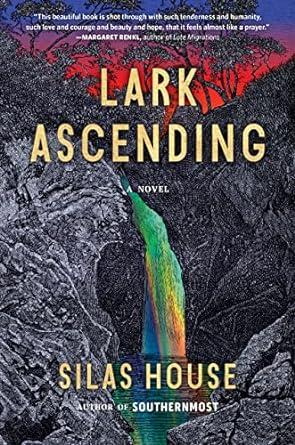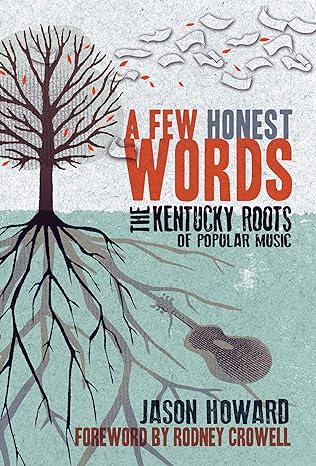
11 minute read
INSIDE VOICES
INSIDE VOICES Robert Gwaltney & Jeffrey Dale Lofton talk with two incredibly talented authors, Silas House and Jason Kyle Howard
Silas House is the New York Times bestselling author of seven novels, including Lark Ascending, which was a Booklist Editors' Choice and is the winner of 2023’s Southern Book Prize and the Nautilus Book Award. In 2022 he was the recipient of the Duggins Prize, the largest award for an LGBTQ writer in the nation. And the following year he was inducted as the Poet Laureate of Kentucky for 2023-2025. House was executive producer and one of the subjects of the documentary Hillbilly, winner of the LA Film Festival's Documentary Prize and the Foreign Press Association's Media Award. His novel Southernmost is currently in pre-production as a feature film. Silas teaches at Berea College, where he is the National Endowment for the Humanities Chair, and at the Naslund-Mann Graduate School of Creative Writing. A native of Eastern Kentucky, he and Jason now live in Lexington, Kentucky.
Jason Kyle Howard is a journalist and nonfiction writer. His feature stories as well as his social and political commentary have appeared in the New York Times, The Atlantic, The New Republic, Town & Country, Oxford American, and NPR to name but a few. The breadth of topics examined by Jason’s keen mind and nimble pen include how the media should cover Trump’s indictment, Queen Elizabeth II’s death, heirs’ property rights of Black South Carolinians, and a gay coal miner suing energy conglomerate Massey Energy for sexual harassment and gender discrimination. Howard is the author of A Few Honest Words, an exploration of how Kentucky has shaped American music. He and Silas wrote both Something’s Rising, an unflinching look at mountaintop-removal coal mining, and the story for the Grammy-nominated music video of In Your Love by Tyler Childers. Jason serves on the faculty of Spalding University's Naslund-Mann Graduate School of Writing.
Inside Voices (Robert); How did you meet?
Jason: We first met in Fairfax, Virginia. I was living in DC and I met Silas at a reading that was part of the Fall for the Book Festival. But we really got to know each other the following year at a week-long writing workshop, and we had an immediate connection. But we started as friends, sharing music and books, talking for hours and also enjoying easy silences.
Silas: We were pretty instantly joined at the hip, with a tremendous amount in common, and an ability to sing together, which helped move the emotions along nicely. When I first met Jason I felt like he was the person I’d been waiting for my whole life.
Inside Voices (Jeffrey): Silas, this question is for you. I am struck by the title of your most recent novel, Lark Ascending, which is the name of the sublimely beautiful piece for violin and piano by Ralph Vaughn Williams, inspired by the poem of the same name by George Meredith, a 19th Century poet. How did either or both of those works inspire you?
Silas: The musical composition is transcendent. I’ve probably listened to it a thousand times and I’ve been deeply moved every single time. I was about halfway through writing the novel when I first heard it. My character’s name was already Lark so my antennae were up for anything lark-related. So I listened, and I was blown away by what a journey the piece of music is. Just about every emotion is contained within and it sounds like an odyssey, which is what I was writing, of course. So I knew right away that it was the main soundtrack for the book. I learned of the poem via the musical piece and there’s a couple of lines in there that are very important to the book: “Because their love of Earth is deep,/And they are warriors in accord”. I think once you read the book you understand how epitomizing of Lark, Helen, and Seamus those lines are.
Inside Voices (Robert): I have another question for you both. Your lives and your work reflect a profound respect for the land and the people and animals that inhabit it. Where does this appreciation come from?
Jason: I grew up in the same small community where my parents were both raised. Everybody knew each other, and so I had a lot of freedom to explore the woods and ride bikes with my friends. But I also spent a lot of time alone. I’m an only child and I was raised to be independent and fend for myself. I was always going outside to climb a tree or to read a book somewhere with my dog trailing along behind me. I think that solitude helped develop a deep love of animals and books and trees. And as a little gay boy growing up in southeastern Kentucky in the 1980s and 90s, who knew I was different even when I didn’t have the language to name it, having those companions was a salvation.
Silas: I think we were both really fortunate to grow up outside, roaming the woods and hills and creeks. When you know the land intimately you come to care for it in a different way. I still have the ridge above our house memorized; I know every inch of it. And I have never not had a dog. I think the natural world and animals build more empathy in us and that’s one thing that artists need the most.
Inside Voices (Jeffrey): As we mentioned briefly during the open, you guys have collaborated on a book and a music video story line. Talk to us a bit about your approach to professional collaboration; and how do you separate the personal from the professional?
Silas: The most important thing is that we both have a deep respect for each other’s writing. We really trust each other and we also both know that any criticism we have of each other’s work is completely constructive because we only want what is best for each other. So I think respect and trust are the keys to working together. It can be really hard for couples but I think it’s always been a very bonding experience for us. Now, moving a piece of furniture is a whole other story. But writing together is always a pleasure with him.
Jason: Yes, you don’t want to be around when we’re moving furniture. But that’s probably true for most couples. Beyond respect and trust, I think it helps that we mostly write in different genres. While Silas does write nonfiction, his literary home is fiction, so we don’t step on each other’s toes too much. And even though we share some similar sensibilities, we also have different interests, aesthetics and experiences. We surprise each other with those differences sometimes, and I think that helps to strengthen our critiques and creates interesting, invigorating discussions.
Inside Voices (Robert): When I was coming along, there were no positive role models in my rural Georgia community. I struggled imagining a future for myself. What lives did you both imagine for yourselves as young people?
Jason: I always knew that at some point I would leave. Part of that was I wanted to leave. I knew from a young age that I belonged in a city. But beyond that instinct, by the time I was in middle school I knew I would have to leave. I knew who I was by then, and apparently others did too. It was a pretty inhospitable place for a gay teenager who was forced to stay closeted. Music was a lifeline for me then. I played Barbra Streisand’s “Gotta Move” and “Somewhere” on repeat. I took Sondheim’s lyrics—there’s a place for us—as a promise. Rosanne Cash’s album The Wheel helped me put language to all the desires and doubts I was feeling, not just as a young gay boy but also as someone who loved language and had started to write. All those songs helped me conjure a future in which I could see myself fulfilled.
Silas: As a child I could have never imagined that I would someday be happily married to a man, much less one that is adored by my parents. If anyone had told me that when I was thirteen—or even when I was twenty-three—I would have laughed in their faces. The only queer people where I lived were very ostracized and treated badly. They had to lead very quiet lives and do most everything in hiding. I always say that half acceptance is not acceptance at all. And there were not very many gay role models in pop culture, either. That representation just was not there when I was growing up in the 1980s.
Inside Voices (Jeffrey): Jason, what responsibility do you believe the arts and those who create art have to speak sometimes-uncomfortable truths?
Jason: To me the arts are the natural arena where we begin to work things out in our culture. People often turn to art when they feel they’re not being heard or seen or understood. As much as art can provide comfort or identification—that feeling of being seen—it can also provoke and disturb, and I think we often need that to move us forward. I also often think about something President Kennedy said, how the pursuit of power can narrow our vision, but poetry opens us up to “the richness and diversity of existence. When power corrupts, poetry cleanses.” God knows we need more poetry now.
Inside Voices (Robert): Silas, with Southernmost currently in pre-production, tell us about the sequence of events that take a writer’s work from page to screen. It seems very exciting. And, of course, inquiring minds want to know not what but who will you be wearing to the premiere?
Silas: Well the dressing up is always the best part! I am so superstitious that I will not be sure this movie is being made until I actually see it on the big screen. But I think it’s a beautiful script and I’m very happy with the casting, although I can’t talk about that publicly so far. It means a lot to me that a gay man from the South has written it and is going to direct the film. He gets so many nuances and we have a sort of telepathy about that stuff. I have just been so happy that someone has interest in it that I’ve tried to be the least intrusive that I can but they’ve included me in the whole process, from getting my opinion on the script to doing location scouting and casting. The writers and actors strikes made us lose a tremendous amount of time but they’re starting to get back on track. Fingers crossed.
Inside Voices (Jeffrey): I have the last question of our time together today, and it’s for both of you gentlemen. What’s next on the horizon? Can you give us a sneak peek? An Inside Voices exclusive?
Jason: I’m about to start a book project that is just beginning to take shape. I’m a bit superstitious when it comes to talking about projects in development, so all I’ll say now is that it is set in DC and I’m looking forward to doing a lot of research there. I’ve been doing a lot of political analysis and commentary lately, and with the presidential election coming up I hope I’ll be doing more. I’ve also got nearly enough personal essays for a collection, so at some point I’ll start working on putting that together.
Silas: I’ve just turned in a short story collection—all about rural LGBTQ people--to my editor. I’m also working on a new novel that’s set in the early 1900s and I’m trying to put together a collection of poetry. I recently finished a play about Mary Todd Lincoln that I’m hopeful about. And I’m always working on a lot of different things at the same time: short stories, essays, journalism, poems.














